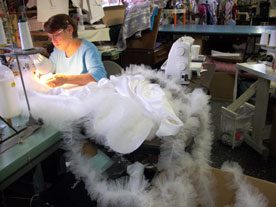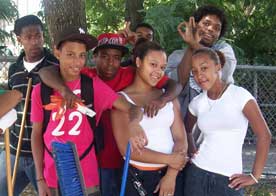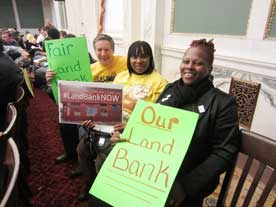Right around the time that Detroit declared bankruptcy, a flurry of stories and trend pieces surfaced about the effects of the decline of manufacturing in America and the potential for a resurgence.
The decline of the manufacturing sector is only a piece of the puzzle for Detroit and not at all unique to that city, but the question is an interesting one: Is manufacturing coming back? Could it?
Maybe. But the consensus seems to be that it won’t be the same kind of driver of job creation that it once was. Alan Mallach wrote recently on Shelterforce‘s blog Rooflines that new manufacturing jobs require higher skill levels and college degrees. A piece in Time magazine from last year, “How Made in the USA Is Making a Comeback,” backs him up: “Today’s U.S. factories aren’t the noisy places where your grandfather knocked in four bolts a minute for eight hours a day. Dungarees and lunch pails are out; computer skills and specialized training are in, since the new made-in-America economics is centered largely on cutting edge technologies.” The new “reshoring” opportunities in manufacturing sound very similar to opportunities already out there that do very little to benefit millions of Americans who are unemployed or underemployed.
Yet in at least two places—Texas and New York—a new wave of smaller-scale manufacturing is creating some jobs and economic self-determination for those who need them most. In New York City, Made in NYC provides support to a burgeoning manufacturing sector that runs the gamut from garments to brews. In San Antonio, Texas, a sewing cooperative emerged out of an organizing effort when a Levi Strauss factory closed down and left a community in pieces.
Made In NYC
Made in NYC is a project of the Pratt Center for Community Development, designed to support the manufacturing sector in New York City. Manufacturers work with Made in NYC for help reaching consumers, finding local suppliers and contractors, and educating the public about their products and the benefits of local manufacturing.
Made in NYC works with companies in each major industry—construction, interiors, apparel and jewelry, food, machinery and metals, and printing—for a total of more than 400 companies in the city’s five boroughs. The focus is to support the production of things that will sell locally, furthering the city’s sustainability, or to use their term, “closing the loop,” instead of depending on exporting and importing.
Adam Friedman, director of the Pratt Center for Community Development and founding member of the Urban Manufacturing Alliance, describes a phenomenon he calls “hollowing out at the middle” where, for years, job creation focused on low-wage sectors like retail, service, and tourism, to the exclusion of manufacturing.
Strengthening local manufacturing benefits both consumers and producers, says Friedman. A designer can have a direct connection with the manufacturer, leading to increased control of the end product and a shorter wait time to see it. When designers use local manufacturing, there are more local manufacturing jobs and a better product for the consumer.
“The designers finally got really fed up with the wait times with manufacturing their product overseas,” said Josh Eichen, business outreach coordinator at Pratt. “They see a real advantage in being able to walk into the factory and talk to someone real. That’s a big advantage for the apparel industry and the same thing goes for jewelry as well.”
In New York City, supporting the manufacturing sector means supporting policies that preserve space and buildings for manufacturing. For example, one of the projects Pratt is working toward is to rehab older industrial buildings to accommodate many smaller manufacturing operations. The organization also supports policies and zoning that would dedicate space for manufacturing to protect existing industrial areas from residential real estate speculation. Such zoning benefits the economy and consumers, says Made in NYC, because people need jobs near where they live.
Made In NYC is also working on the demand side, capitalizing on a shift in consumer preference for more locally-made goods. The motivation for consumers to buy local usually falls into three categories, Friedman says: supporting the local economy, reducing carbon emissions, and building a feeling of pride and value that feeds into a rebellion “against the homogeneity of Wal-Mart and other mass retailers.”
Eichen says there’s also a growing awareness of the conditions of manufacturing plants overseas, like in Bangladesh where fires in garment factories led to the death of thousands of workers.
For consumers, Made in NYC offers an online directory through which they can shop directly from manufacturers and learn about new local manufacturers and designers. The manufacturers listed with Made in NYC can also use the Made in NYC logo on their products to attract consumers who want locally made products.
Friedman says America is poised for a resurgence of manufacturing because of global trends in energy costs and wages. He and Eichen agree that won’t it won’t necessarily support the dramatic job numbers that it once did, but, says Friedman, “If you could increase manufacturing by 5 percent, it could still have a really meaningful impact.”
In New York City, where “inequality” is the buzzword of the year, a burgeoning manufacturing sector should also complement the efforts of community developers focused on affordable housing, says Friedman. “Nationwide, no housing is affordable without a job and the ability for people to maintain a job. … In New York, the folks who do affordable housing are recognizing the need to also engage in job creation activities and focus on manufacturing.”
Made in NYC seeks partnerships with affordable housing and transit developers. For example, it encourages the transportation field to buy new rail equipment from local manufacturers.
At its simplest, a basic premise drives a lot of the programming at Made in NYC: keep the money flowing into local manufacturing.
“We’ve learned talking to people that one of the best ways to make sure manufacturers stay here is to ensure sales,” Eichen says. “Made in NYC is to promote manufacturers and connect the dots to someone who wants to manufacture, or to the consumer that wants to buy those things.”
El Hilo de Justicia
In 1990, a Levi Strauss factory in San Antonio closed suddenly, putting more than 1,150 workers out of a job with very little severance pay. The unemployed women organized themselves to demand fair compensation and better conditions for workers in other factories. “These corporations, they don’t care about the workers,” Viola Casares, one of the former workers, says. “All they care about is produce and produce.”
Over decades of growth, the nonprofit the former Levi’s workers formed, called Fuerza Unida, has expanded to address a number of other issues, including immigration, environmental concerns, health education, and youth leadership. It also formed a sewing cooperative, El Hilo de Justicia—The Thread of Justice.
“After [Levi’s closed] we didn’t know where we could find another job because all we know is sewing,” says Petra Mata, one of the co-directors and co-founders of Fuerza Unida. “The United States has no more factories, so that’s why we formed this project.”
For Mata and Casares, also a co-director and co-founder of Fuerza Unida, manufacturing the way they knew it is dead. Yet, through the sewing cooperative, they’ve been able to not only give a few employees of the shuttered Levi’s factory a better, safer job environment, but also earn a profit that Fuerza Unida uses to support community-based programs such as its food pantry and youth leadership program. When grants are scarce, the sewing cooperative has closed the gap for Fuerza Unida in terms of funds.
The sewing cooperative—and the nonprofit—stayed alive through the recession when other manufacturing plants closed. “We’re still here and that’s what counts,” said Mata. “We learned how to survive in the economy.”
El Hilo de Justicia holds monthly meetings where the workers can talk about issues like health care or immigration and also be kept involved in the operations of the business.
Right now, the cooperative is able to employ a head seamstress and four other seamstresses, but its vision is to employ up to 12 seamstresses and build a model for cooperative textile and garment production.
El Hilo sells jeans, dresses, guayabera shirts, bedding sets, kitchen accessories like pot holders and towels, and purses and tote bags. It also takes custom orders for special suits and dresses for quinceañera parties.
El Hilo products are sold directly from the cooperative’s workshop and through various artisan festivals in and around San Antonio. El Hilo de Justicia also partners with a women’s cooperative network in Chiapas, Mexico, and some of its products are sold there.
To increase interest in its products, in 2012 El Hilo launched an original line of jeans. Community fashion designers created different looks, and they are calling the line Fuerza Jeans or Jeans with Justice. The jeans are made custom for each order using organic denim from Cone Denim in North Carolina.
El Hilo has always sustained itself, but Fuerza would like it to contribute more to the parent nonprofit and its programs. To do this, Fuerza Unida needs what most growing manufacturing plants need—a bigger building and more buyers. It also needs support, financial and otherwise, from city officials.
Fuerza Unida’s leaders want to be able to create more jobs for the community. “Most of our garment jobs are going over seas,” says Mata. “Every day we’re losing jobs.”
“The demand for the product is out there,” Casares says, but it’s still hard to compete against Wal-Mart. “At Fuerza every day people call looking for jobs but we don’t have the space to give people work,” she says.
The two co-founders don’t believe that manufacturing is coming back in a big way, but they do believe that Fuerza Unida can grow through organizing and outreach to the community and offer a sustainable and increasing number of manufacturing jobs.
“We bring the community together and that’s more important than anything,” Mata says.






Comments